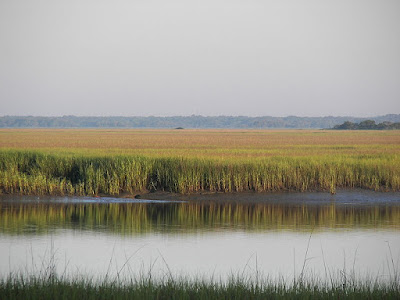 |
| Low Country Beaufort South Carolina |
“Deep, dark depression, excessive misery. If it weren’t for
bad luck, I’d have no luck at all. Gloom, despair and agony on me.” This Buck Owens and Roy Clark tune could be
the mantra for the Wingo clan in Pat Conroy’s Prince of Tides.
Published in 1986, it follows the Wingo family’s desperate
attempt to survive the South Carolina low country, each other and their rural
community. They are a family of shrimpers dependent on the whims of nature. The
twins Tom and Savannah were born in a hurricane. In the company of their older
brother Luke, we learn to enjoy the beauty and solitude of the low country in
spite of its difficult conditions.
The story flashes back and forth between New York City and South
Carolina. Savannah has physically escaped her family and the low country by
fleeing to New York, but mentally she is still imprisoned. The City and the
world have embraced her poetry. Tom is a former high school football coach that
can’t find a job. Tom travels to New York City to assist his sister recover
from slitting her wrists. Prior to leaving South Carolina his wife, Salley
informs him she is having an affair, and she’s not sure she wants Tom to come
back home from New York.
Tom meets Savannah’s psychiatrist, Susan Lowenstein. She
rich, she’s married to a famous violinist, and she is completely unhappy. Tom
dumps his family’s tragic history on her in an attempt to heal Savannah, and
possibly help himself. In a perfect example of misery loves company, Tom and
Susan become extremely close friends, and end up dancing in the sheets.
Conroy uses the location as an antagonist in the story. Like
the other characters the low country has tremendous superficial beauty, but the
personality is mean. The low country symbolizes Conroy’s construct of people;
pretty on the outside but cruel on the inside.
Conroy not only destroys the people in the story, he also
destroys the low country. Based on a
true event, the government builds a plutonium factory in
the middle of the salt marsh destroying the town, the Wingo’s home, the shrimp
industry and ultimately their family.
Conroy wrote a masterpiece. He writes very descriptive prose
that helps the reader visualize the low country. At times he seems to drift
breaking up the flow of the story, but it fits the literary style of the day. Prince of Tides received rave reviews,
and Hollywood made a movie of it. Jimmy Buffett wrote a song about it. The
story was written thirty years ago, but has anything changed?
The story epitomizes the sentiments of today. The characters
have little respect for other people, and treat each other badly. The story
contains a high degree of greed, and little respect for the environment and
conversation. The plutonium though highly regulated still exists today. The
plant is in the process of being upgraded to convert weapons grade plutonium to
fuel for nuclear power plants and waste.
No comments:
Post a Comment